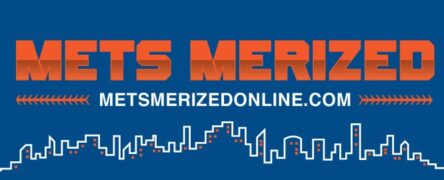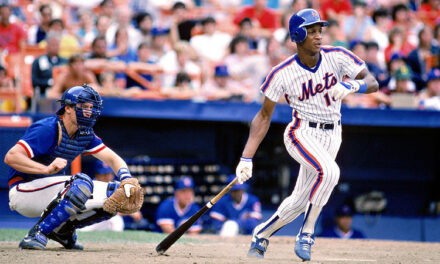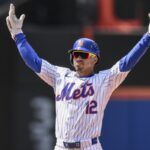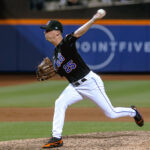
Mandatory Credit: Joe Nicholson-USA TODAY Sports
For Caleb Joseph, the seven-year Major League catcher who played in 425 regular-season games with the Baltimore Orioles, Arizona Diamondbacks, and Toronto Blue Jays from 2014 to 2020, he knew that his value would be in his leadership skills and defensive acumen.
From 2014 through the 2017 season, Joseph recorded 39 defensive runs saved behind the dish. Among catchers, only Buster Posey (+50) and Martín Maldonado (+47) posted more defensive runs saved in that span.
Much of Joseph’s defensive prowess came from his ability to get called strikes on close pitches in the zone. From 2015-2017, Joseph converted 48.7 percent on non-swing pitches into called strikes in the shadow zone (essentially the edge of the strike zone); the 11th-highest mark among 33 catchers with a minimum of 5,000 pitches that were taken in that zone.
Joseph also had a penchant for throwing out baserunners, leading the American League in caught stealing percentage in his rookie year in 2014 (40.4%) and posting a career rate of 31.3%.
Though Joseph wasn’t known as a force at the plate, he did have one stretch where he made quite an impact. In August 2014, Joseph homered in five straight games, becoming the first Orioles catcher to do so in franchise history. He also became just the 15th catcher to homer in five consecutive games.
The veteran catcher spent time with the New York Mets during spring training in 2021 but was ultimately released from his split contract in early May. Though his time in the organization was brief, Joseph, 35, was impressed with the club and the way it was heading.
He’s even more convinced that the Mets are heading in the right direction after the club hired veteran manager Buck Showalter to a three-year contract this offseason. Joseph knows Showalter well as he was his first big league manager and spent five seasons with him in Baltimore.
When asked about his overall thoughts on Showalter as a manager, Joseph isn’t short on praise and adulation for his former manager. Joseph describes Showalter as the “the smartest X’s and O’s baseball manager” he has ever been around, and someone that knows all of the intricacies of the game.
I had the privilege of speaking with Joseph where we discussed his development as a catcher, his plus framing, and thoughts on Showalter as a manager.
MMO: Who were some of your favorite players growing up?
Joseph: I’m from Nashville, Tennessee, and I was a Braves fan. I grew up with the early-to-mid nineties Braves’ teams that included guys like Jeff Blauser, Mark Lemke, David Justice, and both Joneses.
My favorite player was probably Fred McGriff. The whole helicopter swing was something else. I loved that, even though I’m a right-handed hitter. I was drawn to that big home run hitter in McGriff. I got to meet him a couple of years ago and developed a friendship, so that was really cool.
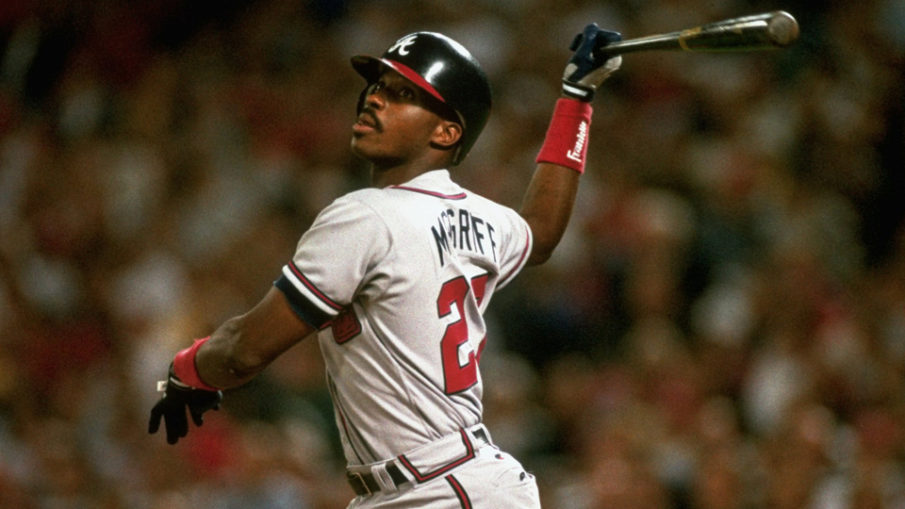
All we had here in Nashville was TBS; this was long before the availability of all of these teams, so you kind of got stuck with either the Cubs or the Braves. Being three-plus hours from Atlanta, it was the Braves for us.
MMO: At what point during your development as a player did you start to focus more on catching?
Joseph: I went to college basically as a shortstop. When I first got there, they were unsure if I was going to be drafted so they went ahead and signed another kid to play shortstop as well as a junior college transfer. He was a really good shortstop.
There were a couple of scouts that saw some potential and started telling me, “You could probably do this as a catcher.”
I realized quickly that I wasn’t the fastest guy and didn’t have the best range. So a guy that can sort of hit and has good hands but can’t run and not the best arm of all time probably ends up at catcher.
It ended up working out and that’s how I ended up behind the plate.
MMO: I read that Lipscomb University was the same school your father and grandfather attended and played ball at. Can you talk about your decision to go to Lipscomb and what attending after your grandfather and father meant to you?
Joseph: In all honesty, I tried not to go there. I wanted to be an SEC-type player and Vanderbilt is right down the street. At that point in 2005, they were not the Vanderbilt that we know now; putting out major leaguer after major leaguer. They were sort of in the basement of the SEC, so I felt like that might be a good spot.
The University of Tennessee was obviously intriguing, and Arkansas had talked to me a little bit. I tried to go somewhere else but it just didn’t work out. A few things fell apart last minute with a number of clubs and Lipscomb was always the safety net.
It was one of those I tried not to go there but it ended up that it was probably best that I was there, type of thing. Looking back, it all worked out as the ultimate goal for me was to play professionally.
I went there and had an amazing coach in Jeff Forehand, who has been a mentor to me and a really close friend. I learned a lot from him and I really grew up there and I was comfortable with the facilities. It was a really smooth transition and I think that really helped with my baseball performance because I was only 25 minutes from home. I was so comfortable at Lipscomb it was almost like I had just graduated high school into an additional high school.
We had some good teams there and a few major leaguers were on that team like Rex Brothers and Josh Smith. We won the A-Sun championship in 2008 and made it to the tournament for the first time in school history the year before in 2007.
We had a lot of good teams and won a lot. [I] made a lot of good friends and it was exactly where I should’ve been.
MMO: After getting drafted in the seventh round by the Orioles in 2008 until the time you made your major league debut in 2014, were there any key adjustments you made in the minors to aid you in your overall development?
Joseph: The funny thing about that entire process was I was kind of known as a hitter who couldn’t catch. They tried for a couple of years moving me around as a utility guy that could catch; there were a couple of years I played some left field and first base.
I had a guy named Don Werner who played with Johnny Bench back in the day, and he was the catching coordinator in Baltimore. He never gave up on me and really believed that I could catch in the big leagues. We worked really hard and just continued to try and get better every day and hone in on some of those skills.
I kind of blinked and found myself stalling out in Double-A. I spent four years there and I just wasn’t quite sure.
The biggest adjustment I made in 2013 was I had been a short stride guy and I had power, but I wasn’t really trying to. And 2013 came around and I developed a leg kick and really tried to hit the ball over the outfielder’s head or over the fence. Something about that leg kick just clicked and I ended up having a breakout season hitting.
I was catching Zack Britton all those years as a starter (in the minors). And you can imagine a 95-97 mph sinkerballer trying to figure out how to throw a sinker. You’ve got a lot of 40-to-50-foot pitches. I don’t know if that was one of the contributing factors to making them think I couldn’t catch because it’s impossible to block a 97-mph sinker in the dirt, as a lot of fans have probably seen in New York with Jeurys Familia. Maybe they thought this guy can’t catch because the balls are always going to the backstop.
I really honed in on some skills and I found a way to get back on the map in terms of offense, and then some things on defense shored up.
I was so excited to get promoted to Triple-A in 2014 and then I blinked and three weeks into the season Matt Wieters had the arm injury and I found myself in the big leagues. I took advantage of an injury and ended up staying for a little bit.
MMO: Your defense was certainly your calling card. You threw out a ton of baserunners and graded extremely well in pitch framing. Was framing something you took pride in, and how would you work on that skill?
Joseph: I found it hilarious, and still due to this day, in that what they (Orioles) said I was probably inefficient at ended up being what kept me in the big leagues for so long in my ability to catch and run a staff. I take great pride in game planning, preparation, and getting to get the most out of those pitchers.
I felt like I always had soft hands, I felt like I could receive the ball well, so of course, just continuing to hone in on some of those skills to present the balls as best as I could and not necessarily trick the umpire but just have a good relationship with them. To make those close pitches look like strikes and definite balls just throw them back. [Laughs.]
It just kind of worked out but I always felt like I could catch in the big leagues; I wasn’t sure if hitting was going to be the same. It’s ironic that some of the upper management thought the opposite. I’m not as surprised, I always thought I could catch in the big leagues, and of course, I hoped I was going to hit in the big leagues. But I believed I could catch.
So, continue to work on all of that stuff daily and find a couple of drills and a couple of key movements or key actions to really focus on and make sure you’re hitting the pocket of the mitt each and every time. Usually, the ball frames itself when you hit it in the pocket. It sounds simple but it’s a lot harder than people think. I have a couple of kids doing lessons right now and we talk about the pocket and make it really pop and get that glove to snap. They look at me like “I’m a catcher, of course I can catch the ball!”
I’m talking about a very specific part in the mitt; it’s way harder than people think. Even a kid that’s committed to going to Vanderbilt here in Nashville, a high school kid and he’s a really good catcher, but it’s taken almost two and a half-three weeks to get him in the pocket consistently.
If you have the right keys that you’re looking for, usually the result happens naturally. Stuff like that in which you start honing in on and take great pride in and you blink, and you end up a decent framer.
MMO: Were you a player that utilized the advanced metrics and tech to enhance your game?
Joseph: I think they had the information in Baltimore but it just wasn’t necessarily relayed to me freely. I never asked for it. I didn’t know how in-depth it was in terms of being able to be measured in all those framing metrics until I went to Arizona in 2019. That was the first time I had seen my advanced metric ratings for my entire career.
I always thought I was pretty good, I mean, I’d just sit back there and go, ‘Man, I feel like I got four or five pitches tonight that might normally be called balls.’ Or the reverse where I didn’t think I had a good game.
I just tried to measure off what my eyes told me. I felt like I was pretty good. The umpires had great things to say about the way I caught the ball, they got good looks, and pitchers never complained.
I went to Arizona and realized, wow, there are several years where I was good! And then I went, it makes sense now how you cannot be the greatest hitter and still provide value. You start realizing WAR and all the advanced metrics that kind of start to paint a fuller picture as to what a guy that’s going to catch 60-85 games looks like, and how they can bring value if it’s not with the bat.
We were big on defense back there with Buck, and we had a couple of guys who came in like Nick Hundley in 2014. I only had one year where I had the lion’s share of playing time, and that was 2015. Then you saw some offensive numbers start to slowly creep up, but I think if you look back I only had over 250 at-bats just a few times.
It just so impossible to do anything with irregular at-bats in the big leagues and so my focus was to provide really good defense and help some of those pitchers out. I wasn’t catching [Jacob] deGrom and [Max] Scherzer and Taijuan Walker, I was catching lower-profile guys, so we’d have to really get the most out of them to get through these A.L. East games. I took great pride in that.
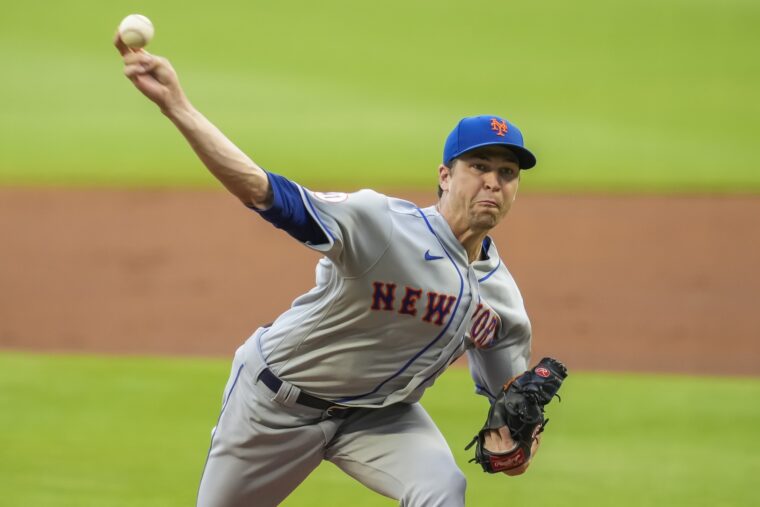
Credit: Dale Zanine-USA TODAY Sports
That was my number one job and I wish I maybe would’ve focused a little bit more on the offense, knowing what I know now that a lot of that value is based on offense, which I learned very, very quickly in arbitration. You can be one of the best defenders in the league and you’re still going to be evaluated on your offense.
Either way, once I started learning that it took a whole new life in terms of understanding the value of certain pitches, how you score, how your score is docked, all of these different things. And then you start focusing on certain aspects and elements.
What’s wild is once I started figuring out those numbers, I actually hit a blip where I didn’t do as well as I had not knowing the [advanved] numbers. I found that incredibly interesting. Knowing that stuff really gives you an idea and paints a nice picture, but at the end of the day, when I step back and stick to those key points and elements, usually, the end result just happens.
MMO: As a veteran catcher who takes great pride in his framing abilities, what are your thoughts on the potential for robo umps?
Joesph: I understand the argument and I understand where people would want that. I understand the ability to get it right, quote-unquote, every time.
I love it when umpires get things right and the game is just unbiased. But I lean on the side of the home plate umpire. There are instances where it is blatant, and a guy is just not having a good day. More times than not, they do have pretty good days.
I just think the aesthetics of the game will look totally different if you start adding in that robot umpire. Guys aren’t going to be worried about the aesthetics of making it look presentable or okay, they’re just going to be back there and blocking the ball.
Just imagine these hitters back there, I mean, I wouldn’t be surprised if there were catchers that went on two knees down, especially if there’s nobody on base. And people might say it’s not about what it looks like, just get it right. And I understand.
For the purist in me, I love a lot of the rule changes and I’m all about the data and enjoy cleaning up a lot of the gray in the game. I’m totally fine with the extra-inning guy on second base; I’m good with the DH in both leagues. I’m just not sure about this one aesthetically.
I’m all about the check swing thing, by the way. If you want to add in a robot to determine check swings, I’m all for that. You can’t ask a guy 110 feet away at a base to make a decision. And how in the world is an umpire supposed to watch a pitch and the batter at the same time?
I love when a pitcher throws a pitch in a very defined spot and the catcher catches it very crisply and cleanly. I think that’s what people are used to seeing. I know the game changes and evolves. There would be nothing worse than a breaking ball that clips the bottom of the virtual box and some catcher catching it and dragging their glove down to the dirt and it’s called a strike. It just wouldn’t seem right.
MMO: As much as I want the calls to be correct, I do feel like instituting the robo umps will take away some of the elements of skill that catchers have in their framing abilities.
Joseph: Oh, yeah. I’m sort of living proof of that to be honest with you. There’s been a lot of weird tweaks and changes in the last five years that I think teams are starting to experiment with. They go in waves and it’s a copycat league, so you have quite a few teams that are molding their philosophies after other philosophies.
I provided nice defense in terms of pitch framing, and I was excellent at throwing out runners and blocking balls. I think just about every bit of my value is from defense. Nothing changed and you can look at some numbers and metrics but when the quantity of those opportunities goes down it’s hard to really score.
You’re at the mercy of where one game behind the plate can set you back with a bad umpire and you’re not doing anything wrong. One game can set you back and if you don’t have enough opportunities to make it up and score, it’ll look like your skills are diminishing. Especially if they’re looking at the offensive side in a backup position.
I can’t believe there was a two- or three-year wave where it seemed like some of these teams were focused on a hitter in that position that’s going to play once or twice a week. Good grief, it is damn near impossible to hit in the big leagues anyway, much less when you’re getting four to eight at-bats a week!
If you know of any teams looking for a good defensive catcher, let me know! I’m still in great shape and I still want to keep going but with that shift in philosophy for some of these teams, it’s kind of squished some of the opportunities out for guys like me.
They’ve given some of those opportunities to younger prospects that have a nice bat. That’s another thing, going with all the data that these teams are so data-driven in terms of their pitch calling, the experience of running a staff and sequencing and knowing the league, some of that has been diminished, too.
You add those factors when it comes to, here’s the wristband, call the pitches on this wristband and we’re good; we’re going to play the numbers. They’re entitled to do that, it’s their organization and they’re in charge.
You add that element and the fact that they’re looking for more of a bat, you have guys like me that get pushed out very, very quickly.
MMO: You’d hate to see veteran catchers who have quality leadership skills and offer more intangibles than can be quantified losing jobs.
Joseph: Yeah, especially when you grew up watching guys like Chad Moeller and Gregg Zaun, and a lot of these second-tier backups play 10-15 years in the big leagues doing exactly what you talked about.
When I came up in 2014, it was really difficult to get in the league because if you didn’t have experience back there, it was the most sought out thing in baseball. When I was in the minor leagues, the experience behind the plate was important, and I used to always ask myself, how in the world am I going to get a job if I don’t have any experience? And how am I going to get experience if I don’t have a job?
And now, good grief, kids are coming up that spend two and a half years in the minor leagues and they’re just slapping a wristband on them and saying, “Go get them, buddy.”
They’re just playing numbers games, so it not only hurts the catcher not being able to truly read swings, but you start boxing pitchers in. That’s the biggest thing that I can’t get over: you start boxing pitchers in.
I had this thing with a pitcher in Seattle. They wanted him to throw 90 percent sliders. He’s got a good slider, but first off, 90 percent sliders are unstainable for anybody’s elbow. There’s nobody that has a bionic arm; deGrom had the most bionic arm I’ve ever seen and even he’s kind of having trouble with some stuff. That’s unsustainable, period. The stress it created on that player was visible, and I had to talk to him last year in Seattle as, I guess I was a bullpen catcher, glorified bullpen catcher. And if he didn’t have that pitch he had nowhere to go.
Imagine a guy coming into a high leverage situation and having one pitch to go to? What if it doesn’t show up there? That’s exactly why you have a veteran catcher to be able to walk guys through these games. I don’t care how old you are, they’re back there and seeing the shape of your pitch, they’re seeing the location and all this stuff. Sometimes you have to call the wrong pitch in the wrong count to get a guy back on track because if you keep going down that road, you know what that ends up looking like. That looks like 3.2 innings, 7 hits, 4 walks, 5 runs, and the bullpen is getting crushed the next day.
There are so many times when we had some of those games. I found a way with some of the starters I’ve had over the years to get five innings and save the bullpen by totally scrapping that game plan because we didn’t have what we thought we were before the game started.
When you go into battle and go into war, the best plan is only as good as the first shot. And the first time the first shot is fired, then all hell breaks loose. That’s exactly what happens in a baseball game. You have no idea if they’re going to come out and ambush the pitcher and they’re going to start attacking first pitch. You might have to do this, you might have to do that, and all this stuff. The wristband can’t predict that, it can’t read that, it’s just kind of giving you spots and places to go.
Now, what I will say is, when you’re in-between pitches as a catcher, it is unbelievable to have the numerical data at your disposal. It helps to create a gut feeling. All that numerical stuff helps to create a gut feeling. When you’re in-between pitches and in a good spot in the game, knowing you’ve got an 80% pitch, as opposed to a 15-20% pitch, I love that! I loved some of these teams that I was with knowing where your safe spot is due to the data. That’s a good way to prevent some of these big and long innings. You’re not throwing it out the window totally but using it as a tool.
Some teams are hanging in there with it and some teams are totally sold by it. It’s all their prerogative and style, but I think some of the teams that are getting it right are using a blend. If you lean one way too heavy, you’re probably in the wrong spot. You don’t use the data, you’re in a bad spot. You totally use data, you become predictable. You can figure out quickly what those pitchers are trying to do to the hitters, and now the approach becomes easier.
I like talking about having insurance policies all over the place for pitchers. Can you do this? Are you just an up fastball, slider below guy? That’s fine, that’s on a great day. But I want to create something for you that when you don’t have that explosive fastball or that slider is not biting, how can we defend ourselves? The card doesn’t tell you how to defend yourself when shit hits the fan. That’s where experience and knowing I can throw this pitch and back him off a little bit, this is not an out pitch it’s a show-me pitch, a chess move pitch to kind of create some room for error for this next pitch. You’ve gone over this before the game, you’re not making it up on the fly. You’ve got a plan A, B, C, all these different things.
It’s worked for me and I love that part of the game. That’s what really brought me joy in baseball was playing that chess game with the pitcher and the hitter and watching these pitchers get out of jams, or watch these pitchers be able to get through a major league lineup, especially the younger ones. That was fun showing them that they can get outs many ways in this league if you use your brain, eyes and you let the game tell you what is next.
MMO: We’ve talked a lot about your defense, but you had one great stretch in your rookie season where you hit a home run in five straight games in August.
Joseph: I think the most amazing thing was it was five consecutive games played, yet it was over a course of four different series, I believe.
I hit one at home versus Seattle, and I wasn’t playing every day, so I was playing sporadically. It wasn’t like a Monday through Friday; this was spread out. This is probably the only thing I can brag on in my career. When people mention it, I always talk about how I did it in Baltimore one game, the next opportunity I had was in Toronto where I played the first and third games and hit two there. Before that, we played a two-game series in Washington, and I hit one there. It was Baltimore, Washington, Toronto, and then back home against the Cardinals, I hit one off John Lackey.
It was four different series and that’s what I remember about that. And being able to do that in three different cities was cool! I hit two off teammates that would be in James Paxton and Tanner Roark, so that was cool.
I think what I remember most is the last one. It was kind of a tight game, day game versus the Cardinals and Lackey had been around for a long time. And I jumped ship, I rarely swung at the first pitch (four of Joseph’s 32 career homers came on the first pitch), and I hit it off the end of the bat just a little bit. And day game in the middle of summer in Baltimore and it just barely got over right towards the bullpen in left-center field. It kind of swung the game and we ended up winning, so I’m probably most proud about that one.
I rarely got fired up, I was always taught to act like I’ve been there before, but that one I kind of let some emotions out. I knew my value was on defense, but being able to do something and provide on offense made me feel complete, at least for five games. [Laughs.]
MMO: Another thing you should add to the list of things to brag about is your career 0.00 ERA in two appearances. What do you remember from those two appearances with the Diamondbacks in 2019?
Joseph: It was as scary as it was fun. The last time I had pitched I was 12-years-old. It was one of those games where I was the third catcher in Arizona at that point and we were getting manhandled by the Cubs.
There weren’t many guys left on the bench, he (Torey Luvullo) subbed out some of the regulars to get them off their feet. I was kind of the last one. There wasn’t really anything said, when you’ve been around long enough you kind of just know.
It was my first time in the National League and I just kind of knew that there was no way we were going to keep running through this bullpen. I just looked at Lovullo and our eyes met, and I just walked over to him and said, ‘Look, I’ll do it and I’ll throw strikes.’ He was like, “Okay, man. You got it.”
I just grabbed a glove and went to the bullpen and threw six or eight pitches trying to dial it in. The only thing I knew was I didn’t want to try and be that guy that threw 85 mph right into the perfect hitting speed, so I tried to throw well below it. [Laughs.]
I had a range of like 53-79 mph, but it wasn’t all fun and games, again, I’m just trying to get off the field. Everyone’s been there for three hours and we’re getting our butts handed to us. I take baseball real seriously, even when we’re getting manhandled. I respect the game way too much. And I get it, people have fun, and it was fun. But it was fun when the third out was made and we’ve gotten off the field. I didn’t want it to prolong any more than it had to be, so I was taking it seriously but at the same time I got up on that mound and I was like, this is cool. Not many people can say they’ve pitched in a big-league game.
Then, stepping up to the plate was Javier Báez. Then I realized he was closer from this vantage point than it looks from my vantage point behind the plate. I knew right away that I had nothing to defend myself from this guy who can hit it about 200 miles an hour, and he could very well break my leg. It became serious. I just lobbed that first one there and braced for impact, and he ended up popping it up first pitch. I ended up getting two more outs from Jason Heyward and David Bote.
Then it was probably five or six days later and we were in the same situation in Washington, and same thing. I had to pitch against another catcher, and I hate getting other catchers out, it’s kind of like the code of conduct. It was Yan Gomes and he’s a friend of mine, we’ve done a number of events together in Nashville. I lobbed it in there and he ended up grounding out and that was it. Four up, four down.
Any advice I give to pitchers is, ‘Look, you can do whatever you want but just know this is coming from a guy that has zeroes across the board on the mound.’ [Laughs.]
MMO: Your time with the Mets was brief in 2021, but what were your takeaways on the organization?
Joseph: I had a great time. I really liked what was going on there. I was really, really hopeful that there was going to be an opportunity here or there if there was an injury or insurance policy if something happened in the big leagues. There was a couple of things that didn’t work out, so I moved on looking for a real playing opportunity. I just didn’t want to get stuck on a bench. And lo and behold, as soon as I left both James McCann and Tomás Nido went down with injuries, and if I would’ve stayed, I might’ve had an opportunity. That’s about how it’s going for me right now, but I enjoyed it a lot.
I liked Luis Rojas, I thought he had a great heart. Dave Jauss was in spring training with the Orioles I think in my first spring training in 2010, so that was a familiar face. He’s a great guy and threw amazing batting practice to Pete Alonso in the Home Run Derby. He’s amazing at batting practice!
Being able to watch a guy like Jacob deGrom come in and just do his work and be surrounded by a guy that’s one of the best in the business, if not the best and a generational talent, was a really cool moment I enjoyed.
It was a great clubhouse and I really enjoyed it. I was really looking forward to big things from them last year and was really sad to see things go downhill towards the end. But I think they’re in really good hands with Buck, and I will be watching that team closely.
And you never know, you can never say never, right? I’d be really interested in helping the Mets out in some sort of capacity. I really enjoyed that crew over there. Taijuan Walker, we were teammates in Toronto, awesome, awesome guy. I love Jeff McNeil. I was teammates with Miguel Castro in Baltimore, and he’s a great guy. Jeurys Familia is one of the nicest guys in baseball.
Just a great clubhouse and I really enjoyed my time. I’m really looking for big things from the Mets this year.
MMO: You mentioned Showalter, who was your first big league manager and someone you spent quite a lot of time with him Baltimore. What should Mets fans expect from Buck at the helm?
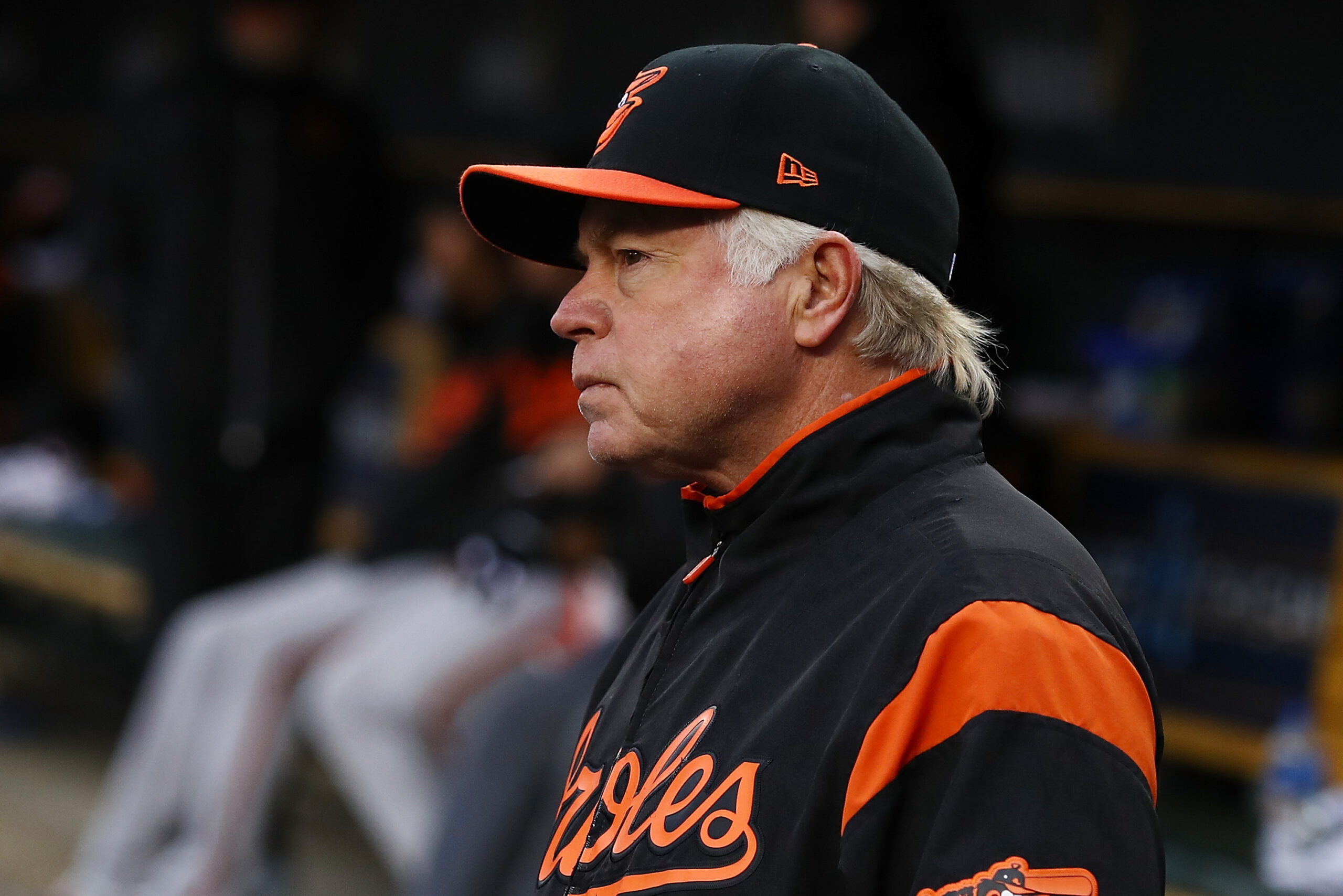
Joseph: He is the captain of the ship and he mans a great ship. He’s easy to trust. He knows what he’s talking about and is by far the smartest X’s and O’s baseball manager I’ve ever been around, and probably will ever be around.
He’s incredibly detail-oriented, you can’t get anything past him. If there is a play in left field and the right fielder trips and falls, he’ll catch it.
I’ve told this to a couple of people, but you get to a certain point in your career where you’ve played long enough and you feel like you’ve played baseball for 20 years and there’s not much that surprises me or learn about the game. I understand the cutoff on relays, I understand the sequencing of hitters, I understand all this type of stuff. But then you get to be managed by Buck and you start realizing that there’s so much more to the game and all the minute details that seem obsolete at the time yet add up to little inches. It’s like the line from Any Given Sunday, you start adding up all those inches and it’s all those inches that can literally change a game.
When you’re talking about the major leagues, you’re looking at any sort of advantage to win a baseball game. Winning in the big leagues is really, really hard. And if you can find a way to execute a cutoff in a relay in the bottom of the ninth, and you can find a way to keep a guy from stealing a base, whether it’s a pitcher holding the runner with various looks and getting detail-oriented in these minute details, you find out that you don’t beat yourself. That’s so huge because the game is about 90-foot increments, and the turnover battles are unbelievable and unbelievably important in the game.
So many guys talk about the strikeouts and homers and all this other stuff, but when you’re in it and you’re under Buck Showalter, you start realizing how precious 90 feet is. Any sort of play and advancement of 90 feet freely given or taken can dramatically affect the game and start to create momentum and create big innings and create stress-filled pitches for pitchers.
You start seeing the game totally different and what happens is you know where to be because you’ve been trained in the exact right spot. Not that other teams don’t do this, but to the detail where you realize when you go into battle that you’re totally prepared and there’s not a single thing that can throw you off and you have 26 guys on the exact same page when it comes to the fundamentals of baseball.
It sounds so cliché, it’s just like catching the ball in the pocket, but there are so many teams that lose these inches. And they lose them and lose them and lose them, and they look up and they’ve had a three-run inning and they find a way to crawl and scratch their way back, but they end up losing by one run. Well, if we would’ve just done this or this maybe we didn’t beat ourselves.
He’s going to bring real solid fundamentals to that club and they’re not going to beat themselves. If you look on paper, my goodness, they shouldn’t lose a single game. They’ve got a ton of talent and I think from a manager’s perspective, I would think your only goal is to keep your players from beating themselves. If you believe in the talent that your GM has acquired and you can keep them from beating themselves, in terms of these little plays and things that are controllable, if you have a good, assembled team that can win games then you should feel good about your chances.
He’s an amazing X’s and O’s guy, he’s probably the best bullpen manager I’ve seen. Those bullpen guys in New York are going to love Buck. He’ll never put them into a position where their health is at risk. They’ll be fresh, he knows how to manage a bullpen better than anybody I’ve ever seen. Managing a bullpen is also predicated on how well your starting pitchers are, and he’s got two of the best in the world on the same team now.
He’s a really funny guy, a lot of people talk about his attention to detail and the way he stewards a ship. But he’s a really funny guy and very motivational. It’s serious business when it’s going on, but he is funny and he’s great to be around.
I’ve texted a number of former Mets teammates and have told them that I think they’re really going to love Buck. He’s a great manager to play for and you’ll feel like you’re totally prepared, not only with all of the stuff in terms of data that’s going to be given but also just keeping the clubhouse light and being there before. He’s done it before in a number of major cities and he’s done it in New York. It’s a different animal in New York and he’s been there, done that. I’m excited to see how it turns out.
MMO: Would you agree that Showalter is a good blend of incorporating the analytics while also utilizing his instincts and experience in the game?
Joseph: I would, yeah. There was a little phase there where I think anybody that maybe has a little bit of gray hair may get boxed into a corner in that this guy is not going to use analytics. But Buck’s been using analytics before both of us were even born. It was old-school pen and paper drawing lines on paper when he was in the minor leagues managing.
Buck’s got an unbelievable memory, like I said, you can’t get anything past him. He knows the league, he’s been in it, and he knows certain players, but having the advanced metrics and data at his disposal versus him having to go do all the work is an incredible tool for him. I think he’s going to mix it perfectly.
Look at the Braves, they seemed to be mixing it well. Even in Houston with Dusty Baker, I didn’t see Martín Maldonado going to the wristband, he’s calling games from a number of different sources.
All that data is going to give Buck a nice gut feeling, and for a guy like Buck who has been around as long as he has, a lot of that data just solidifies what his eyes are telling him. He’s not against it at all and he’ll use it and he’ll be able to find that perfect blend that I think everyone is looking for.
MMO: The one complaint that I thought was overblown was that Showalter had been out of the game too long. I mean, he last managed in 2018 and then did studio analyst work at MLB Network, where he kept up with the game and all thirty clubs.
Joseph: He’s as sharp as a tack and I know he has a nice golf game, so I’m sure he’s had some time on the fairways and greens. But outside of that, you’re exactly right: he eats, sleeps, and breathes baseball. There won’t be anybody that is more prepared than Buck. I’d give him ten years off and I think he’d step right into a situation where he knew what was going on. He keeps up with it and we’ve had numerous conversations on the phone over the last couple of years, and he’s dead on with what’s going on.
This isn’t some guy that’s being pulled out of some vacation rental who hasn’t been paying attention. It’s the opposite. If anything, he’s paid more attention to not only baseball but just the league in general because he wasn’t solely responsible for one team. He was using all that energy and focusing it on thirty teams versus one. It’s actually scary, he might be even more poised than ever because he’s been paying attention to the entire league! That’s how I think about it.
If you don’t know Buck, it’s easy to see where it could be a roadblock, but I honestly think it totally works to his advantage because there’s nothing that gets past him. I can’t stress that enough.
MMO: You talked before about wanting to keep playing. If that doesn’t pan out, would you still want to remain in baseball in some capacity? Perhaps as a coach, instructor, or broadcaster?
Joseph: I’ve had a couple of opportunities that have presented themselves. I have a six-year-old boy and a four-year-old little girl and so life is presenting some challenges. I’m trying to figure out if coaching is something that life-wise would be good for our family.
I love the game, love talking about it, love doing it, and love being a part of it. I’ve always seen myself as a lifer, sort of similar to Buck. I’d love to stay in the game and hopefully there are opportunities where organizations see the value and they want to add to that.
I understand that I’m working under a bit of a caveat in that I’m not necessarily interested in going to manage an A-ball team with two young kids at this moment. But I’d love to stay in it, I really enjoy it and for most of us it’s what we’ve done since we were three or four years old. It becomes a huge part of your life and to think about not being involved with some organization is a bit odd.
I do love the game more than ever and feel like there’s a really good opportunity for people like me who have experience with the old-school way and with this boom of analytics and being able to decipher both and not be heavy leaning to one side. I feel there’s immense value in bringing some of that experience with the knowledge of how the game has trended in terms of the metrics and being able to communicate effectively in how well those things work and don’t work.
MMO: Thanks so much for speaking with me today, Caleb. I really appreciate all the terrific insight you shared.
Joseph: You got it!
Follow Caleb Joseph on Twitter, @YYZBackstop
